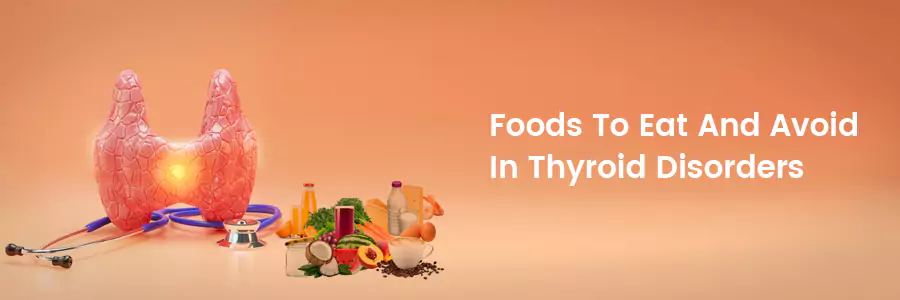Foods To Eat And Avoid In Thyroid Disorders
Thyroid hormones are very important in growth regulation, cell repair, and metabolism control. Basically, the thyroid gland produces three types of hormones: triiodothyronine (T3), thyroxine (T4), and calcitonin. When the thyroid gland becomes overactive, it secretes hormones at an abnormally rapid rate, resulting in hyperthyroidism. In contrast, hypothyroidism, or underactive thyroid, prevents the gland from secreting an adequate amount of hormones.
During pregnancy iodine is essential for the correct development of the baby’s brain.In India soil is deficient in iodine and the population is prone to IDD, hence salt is fortified with iodine.
Iodised salt is fortified to provide 100% of a person’s iodine requirements and is highly effective. Double fortified salt was developed to provide 30% of the Iron requirement and 100% of iodine requirement.
Iodine intake in adults should not exceed 600mcg/day
Here is the list of foods that are high in iodine.
Foods good for thyroid health
Richest source fish, milk and diary products.
White fish has more iodine than oily fish.
Soya milk, almond milk and oat milk are not fortified with iodine and have low iodine content.
Sources of excess iodine can be from the over consumption of iodized salt, drinking water, milk rich in iodine, certain seaweeds, dietary supplements containing iodine.
Iodine toxicity can lead to thyroiditis, hypothyroidism, hyperthyroidism and thyroid papillary cancer.
1tsp of salt 5.69gm gives 228mcg of iodine which is 1.5times more than our requirement.
Foods to avoid by thyroid patients
Thyroid patients should avoid eating highly processed foods that are high in calories. They are as follows:
Soy
Isoflavones, a compound found in soy, may have a negative impact on the thyroid gland. Some researchers believe that eating too much soy increases the risk of hypothyroidism.
Kale
Kale is a mild goitrogen that can prevent the thyroid gland from properly utilizing iodine. In addition, experts advise patients to avoid eating cabbage, Brussels sprouts, cabbage, bok choy, and turnips to avoid thyroid complications. All of these vegetables may interfere with thyroid hormone production.
Gluten
Gluten is a protein that is abundant in processed foods such as wheat, barley, rye, and other grains. Patients with hypothyroidism should limit their gluten intake to help their thyroid recover faster.
Foods with high sugar content
Foods with a high sugar content are frequently responsible for weight gain due to an excess of calories. Because hypothyroidism disrupts metabolism, doctors advise patients to avoid sugary foods.
Caffeinated Beverages
Coffee and caffeinated beverages are the next foods to avoid if you have thyroid problems. Caffeine significantly inhibits the absorption of thyroid hormone replacement.
Alcohol
Alcohol consumption impairs thyroid hormone secretion. Furthermore, it has a negative impact on thyroid hormone levels and inhibits the human body's ability to use them.
Processed Food
Sodium levels are too high in processed foods. Patients with hypothyroidism must limit their sodium intake because hypothyroidism causes high blood pressure.
Foods with High-Fat Content
High-calorie foods frequently interfere with thyroid hormone production. Fried foods are unhealthy for thyroid patients because they contain a lot of butter, mayonnaise, margarine, and animal fats. They can disrupt the body's ability to absorb adequate thyroid hormones.
Meats
The kidneys, heart, and liver of edible animals are high in lipoic acid, which disrupts thyroid gland function. As a result, experts do not regard them as the best foods for thyroid patients.
Diet/Carbonated Beverages
Artificial sweeteners in diet or carbonated sodas are harmful to thyroid hormones and immunity. Consuming sugar-free beverages poses a serious health risk to thyroid patients.
Individuals should, however, seek the advice of a medical professional before incorporating the best foods for thyroid patients into their daily diet. If anyone is allergic to a specific food, inform the doctor so that appropriate substitutions can be made.
If you have thyroid disease and are looking for the best Endocrinologists then consult us. Medicover hospitals have the Best Endocrinologists in India who are experienced in managing hyperthyroidism and hypothyroidism.


